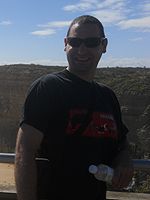Difference between revisions of "Pichaud 2013 Abstract MiP2013"
Marte Verena (talk | contribs) |
|||
| Line 14: | Line 14: | ||
|tissues=Skeletal muscle | |tissues=Skeletal muscle | ||
|preparations=Permeabilized tissue | |preparations=Permeabilized tissue | ||
|enzymes=Complex IV; | |enzymes=Complex IV;cytochrome c oxidase, Marker enzyme, TCA cycle and matrix dehydrogenases | ||
|injuries=RONS | |injuries=Oxidative stress;RONS | ||
|diseases=Aging; senescence | |diseases=Aging;senescence | ||
|topics=ADP, Flux control, Inhibitor, O2, Redox state, Substrate, Temperature, Uncoupler | |topics=ADP, Flux control, Inhibitor, O2, Redox state, Substrate, Temperature, Uncoupler | ||
|couplingstates=LEAK, OXPHOS, ETS | |couplingstates=LEAK, OXPHOS, ETS | ||
|substratestates=CI, CII, GpDH, CIII, CIV, CI | |substratestates=CI, CII, GpDH, CIII, CIV, CI&II, ROX | ||
|instruments=Oxygraph-2k | |instruments=Oxygraph-2k | ||
|additional=MiP2013 | |additional=MiP2013 | ||
Revision as of 16:32, 10 February 2015
| Pichaud N, Blier PU(2013) Importance of mitochondrial haplotypes in the expression of metabolic phenotypes under different conditions. Mitochondr Physiol Network 18.08. |
Link:
MiP2013, Book of Abstracts Open Access
Event: MiP2013 Programme
Differential expression of genes mediated by environmental parameters has the potential to influence the organismal phenotype. Considering the central importance of mitochondria in physiological processes such as senescence and life history traits, we hypothesize that expression of mitochondrial genes, under different environmental conditions, should be under strong evolutionary constraints. Integrity of mitochondrial functions requires a synergistic interaction between the mitochondrial and nuclear genomes with proteins produced from mtDNA genes interacting with proteins imported from nuclear encoded genes to produce a functional mitochondrial electron transfer system (ETS). Using permeabilized fibers of Drosophila expressing different mtDNA haplotypes in a homogenous nuclear background, we investigated the effect of several conditions such as aging, temperature and diet on mitochondrial functions. We showed that different set of conditions may trigger the expression of a particular phenotype caused by mtDNA divergences. This is of paramount importance to understand the influence of the environment on mitochondrial evolution in a wide variety of species including humans and has the potential to provide a cohesive picture of the underlying mechanisms of co-evolved ETS Complexes.
• O2k-Network Lab: CA Rimouski Blier PU
Labels: MiParea: Respiration, mt-Biogenesis;mt-density, mtDNA;mt-genetics, nDNA;cell genetics, Exercise physiology;nutrition;life style Pathology: Aging;senescence Stress:Oxidative stress;RONS Organism: Drosophila Tissue;cell: Skeletal muscle Preparation: Permeabilized tissue Enzyme: Complex IV;cytochrome c oxidase, Marker enzyme, TCA cycle and matrix dehydrogenases Regulation: ADP, Flux control, Inhibitor, O2"O2" is not in the list (Aerobic glycolysis, ADP, ATP, ATP production, AMP, Calcium, Coupling efficiency;uncoupling, Cyt c, Flux control, Inhibitor, ...) of allowed values for the "Respiration and regulation" property., Redox state, Substrate, Temperature, Uncoupler Coupling state: LEAK, OXPHOS, ETS"ETS" is not in the list (LEAK, ROUTINE, OXPHOS, ET) of allowed values for the "Coupling states" property.
HRR: Oxygraph-2k
MiP2013
Affiliations and author contributions
Laboratoire de Biologie Intégrative, Université du Québec à Rimouski, Canada. - Email: [email protected]
